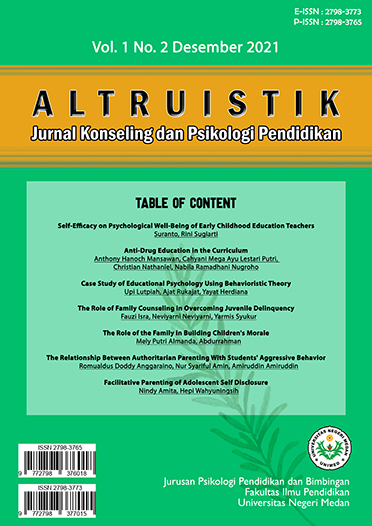The Role of Family Counseling in Overcoming Juvenile Delinquency
DOI:
https://doi.org/10.24114/altruistik.v1i2.27178Keywords:
Family, Counseling, Adolescent, Juvenile DelinquencyAbstract
Juvenile delinquency is one of the deviant behaviors that requires special attention and good understanding and proper handling of the resolution process because it is an important factor for the success of adolescents in the next life, considering that the teenage transition period is the most decisive period. There are several roles that parents can do in overcoming juvenile delinquency, including the process of fostering and guidance carried out by the family. Parents try to create a harmonious, communicative and comfortable family for adolescents and help adolescents in their social and adjustment processes. Family counseling is a training process that is focused on the client's parents as the most influential person in determining the system in the family. This is done not to change the personality or character of the family members involved but to change the family through changing the behavior of the parents. If the behavior of the parents changes, it will affect the members in the family.References
Ali, M., & Asrori, M. (2012). Psikologi Remaja Perkembangan Peserta Didik. Bumi Aksara.
Andriani, J. (2017). Lingkungan Keluarga dalam menangani masalah kenakalan remaja. At-Taujih: Bimbingan dan Konseling Islam, 23(5), 479-486.
Departemen Pendidikan Nasional, (2008). Kamus Besar Bahasa Indonesia, edisi keempat, Balai Pustaka.
Hidayah, R. (2009). Psikologi Pengasuhan Anak, UIN-Malang Press.
Hurlock. (1996). Psikologi Perkembangan (Suatu Pendekatan Sepanjang Rentang kehidupan), (Alih Bahasa: Istiwidayanti dan Soedjarwo). Erlangga.
Kartono, K. (2011). Patologi Sosial 2 Kenakalan Remaja. RajaGrafindo Persada.
Kartono, K. (2011). Patologi Sosial. Rajawali Pers.
Lestari, S. (2013). Psikologi Keluarga, Kencana.
Partowisastro, K. (1983). Dinamika Psikologi Sosial. Erlangga.
Sarwono, S. W. (2012). Psikologi Remaja. Rajawali Pers.
Simanjuntak, B. (1984). Latar belakang kenakalan remaja. Alumni.
Singgih, (2001). Psikologi untuk Keluarga. BPK Gunung Mulia.
Sudarsono. (2012). Kenakalan Remaja. Rineka Cipta.
Yusuf, S. (2005). Psikologi Perkembangan Anak dan Remaja, Remaja Rosdakarya.
Downloads
Published
Issue
Section
License
Copyright (c) 2021 Fauzi Isra, Neviyari, Yarmis Syukur

This work is licensed under a Creative Commons Attribution-ShareAlike 4.0 International License.
Authors published in this journal agree to the following terms:
- The copyright of each article is retained by the author (s).
- The author grants the journal the first publication rights with the work simultaneously licensed under the Creative Commons Attribution License, allowing others to share the work with an acknowledgment of authorship and the initial publication in this journal.
- Authors may enter into separate additional contractual agreements for the non-exclusive distribution of published journal versions of the work (for example, posting them to institutional repositories or publishing them in a book), with acknowledgment of their initial publication in this journal.
- Authors are permitted and encouraged to post their work online (For example in the Institutional Repository or on their website) before and during the submission process, as this can lead to productive exchanges, as well as earlier and larger citations of published work.
- Articles and all related material published are distributed under a Creative Commons Attribution-ShareAlike 4.0 International License.
All writing in this journal is the sole responsibility of the author. Altruistik provides open access to anyone so that the information and findings in these articles are useful for everyone. Altruistik can be accessed and downloaded for free, free of charge, following the creative commons license.
License
ALTRUISTIK : Jurnal Konseling dan Psikologi Pendidikan is licensed under a Creative Commons Attribution-ShareAlike 4.0 International License.
You are free to :
Share — copy and redistribute the material in any medium or format
Adapt — remix, transform, and build upon the material for any purpose, even commercially
Under the following terms :
Attribution — You must give appropriate credit, provide a link to the license, and indicate if changes were made. You may do so in any reasonable manner, but not in any way that suggests the licensor endorses you or your use.
ShareAlike — If you remix, transform, or build upon the material, you must distribute your contributions under the same license as the original
No additional restrictions — You may not apply legal terms or technological measures that legally restrict others from doing anything the license permits


